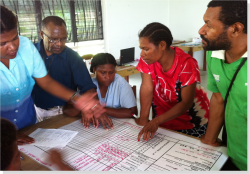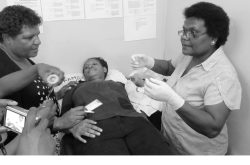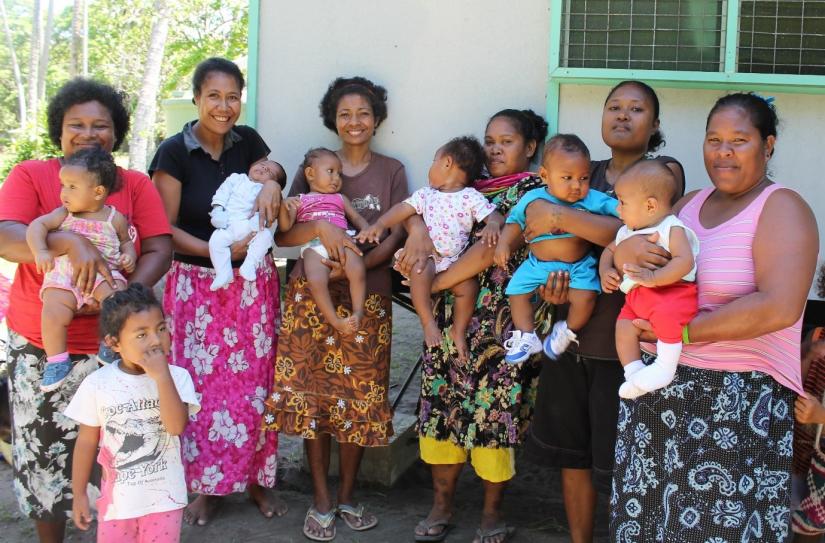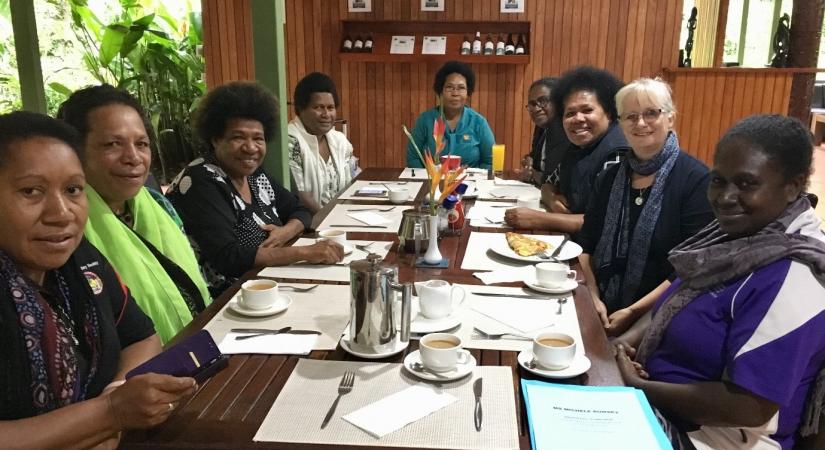Date: 2011-ongoing

Investment in health system improvement in Papua New Guinea has led to many projects being undertaken between 2011-ongoing focussing on governance, service delivery and infrastructure. The World Health Organization Collaborating Centre at University of Technology Sydney (WHO CC UTS), in partnership with the National Department of Health Papua New Guinea (NDoH) and Department of Foreign Affairs and Trade Australia (DFAT) integrated their work to address four areas affecting the health workforce: governance, education, association and regulation. All of these projects aligned with each other and grew out of previous work undertaken such as the Ministerial Taskforce on Maternal Health Papua New Guinea 2009.
Maternal and Child Health Initiative
In late 2011, the Maternal Child Health Initiative (MCHI) in Papua New Guinea (PNG) was funded by DFAT. The long-term goal of the MCHI was to build midwifery capacity in PNG to ultimately reduce maternal and child deaths aiming to:
- improve maternal and child health,
- increase the quality of health workforce and
- improve services in priority provinces.
https://www.womenandbirth.org/article/S1871-5192(15)00327-3/pdf

Reproductive Health Training Unit (RHTU) – Monitoring & Evaluation
The Reproductive Health Training Unit (RHTU) in Papua New Guinea (PNG) is a Public-Private Partnership (PPP) between the NDoH, DFAT as funders and Oil Search Foundation (OSF) as initial managers and implementing partner. The principal purpose of the RHTU is to improve the knowledge, skills and attitude of front line health workers in Essential Obstetric Care (EOC) and Emergency Obstetric Care (EmOC) service provision in PNG.
Training Institute Audits
2012-2015 NDOH DFAT Diagnostic Audits, carried out a systematic approach to collecting and reviewing data at all Schools of Nursing and Community Health Worker Training Institutes in Papua New Guinea. Key findings of this audit are to:
- Urgent need to review nursing and community health worker curriculums in-line with the National Health Plan 2011-2020.
- Strengthening of regulation, standards, and accreditation process.
- Urgent need of preceptorship trainings.
- Access to educational resource materials and internet services.
- Infrastructure improvements.

Quality Improvement Plans
Quality Improvement Plan is a tool that has been developed to improve the quality of services provided by the educational institutes. It reflects the recommendations following the 2012-2015 NDOH DFAT Diagnostic Audits.
Outcomes:
- Opportunities were identified to improve the operations of each Institute with the end result of delivering better services to students and population of PNG.
- Principals and staff from nine Schools of Nursing/Midwifery (SON) and twelve Community Health Worker Institutes (CHW) came together in 2015 supported by NDoH and the DFAT.
Principles Consensus Statement 2015
Principals and staff from nine Schools of Nursing/Midwifery (SON) and twelve Community Health Worker Institutes (CHW) came together on 23 – 27 February 2015 supported by the National Department of Health (NDoH) and the Department of Foreign Affairs and Trade Australia (DFAT). This meeting was convened to produce Quality Improvement Plans as recommended in the 2012/2013 NDoH DFAT Diagnostic Audits of SONs and CHWs.
Morale of educators is low; the Diagnostic Audits show educators remain for one to five years. The following recommendations have been prioritised to address ongoing issues:
- Urgent need to review both the nursing and community health worker curriculums in line with the new National Health Plan 2011-2020.
- Strengthen partnership with NDoH in terms of communication, continuing professional development, and ensuring consistency in funding including salaries for state and church schools.
- It is essential that all training institutes and students have access to, and are provided, copies of treatment books and national standards.
- Training institutes are in urgent need of internet services to enable high quality education provision to students.
- Continued in put for infrastructure improvements following NDoH DFAT Diagnostic Audits carried out in all nursing and CHW institutes.
- It is essential the Principals of all training institutes of nursing, midwifery and CHWs meet annually.

Regulation
The PNG Nursing Council’s (PNG NC) role is to register nurses and midwives as well as provide standards and accreditation for educational institutes. Due to an extreme backlog of registrations and some institutes not being audited for 30 years work was needed to update processes, protocols and standards.
Link to PNG Nursing Council Reports
https://www.health.gov.pg/subindex.php?health_ministry=7
http://www.health.gov.pg/nursing_pdf/PNGNCR_2016.pdf
https://www.uts.edu.au/research-and-teaching/our-research/who-collaborating-centre/news/nursing-council-papua-new-guinea-releases-update-2014-registered-nurses-and-midwives
Please see the following documents below:
- A report on the work value of nurses employed in public health facilities (2008)
- WHO Scaling-Up Nursing through Global Nursing and Midwifery Faculty Development: A Report on Nursing & Midwifery Education Programs, Faculty Staff and Nurse Educators in the Western Pacific (2013)
- WHO Nurse Educator Core Competences (2017)

